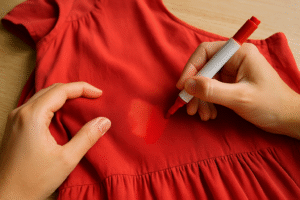ntroduction: Why Knowing How to Remove Cast Iron Stain from Counter Is Essential
Countertops are a vital part of every kitchen, offering both functionality and style. However, these surfaces can quickly become tarnished by stubborn stains, especially those caused by cast iron cookware. Learning how to remove cast iron stain from counter is an essential skill that not only keeps your kitchen pristine but also helps prolong the life of your countertops.
Cast iron stains can occur when moisture interacts with the iron and leaves a rust-like residue on your counter. These stains are notoriously stubborn, and without the right approach, they can become permanent eyesores. Understanding the nature of these stains and knowing how to deal with them is the first step to maintaining a spotless kitchen.
In this guide, we’ll explore various methods to effectively remove cast iron stain from counter surfaces. From natural remedies to specialized cleaning products, we’ll provide comprehensive solutions for every type of countertop material, including granite, quartz, laminate, and marble. By the end of this article, you’ll have all the knowledge you need to tackle these pesky stains and restore your counters to their original beauty.
The Science Behind Cast Iron Stains
Cast iron stains form when iron comes into prolonged contact with moisture and air, creating rust. This rust can transfer to countertops, particularly when the surface is porous or improperly sealed. Understanding this process is key to effectively tackling the problem.
Rust is composed of iron oxide, which bonds to surfaces and creates discoloration. This bonding can be especially strong on porous materials like granite or unsealed wood, where the iron particles seep into the material. To successfully remove cast iron stain from counter, it’s crucial to use methods that break down these bonds while preserving the integrity of the countertop.
Quick Fixes for Fresh Stains
When a cast iron stain is fresh, acting quickly can make all the difference. Begin by blotting the area to remove excess moisture and prevent the stain from setting. Use a soft, damp cloth to gently wipe the stain. Avoid using abrasive materials at this stage, as they can spread the stain or damage the surface.
A quick solution involves creating a mild soapy mixture with dishwashing liquid and warm water. Dip a cloth into this solution and gently clean the area. Although this approach may not completely remove cast iron stains, it can prevent them from deepening.
Using Baking Soda and Vinegar
A classic solution for tough stains, baking soda and vinegar create a powerful cleaning agent. Here’s how to use them:
Mix baking soda with water to form a paste.
Apply the paste to the stain and let it sit for 10 minutes.
Pour vinegar over the paste and scrub gently.
Wipe clean with a damp cloth.
The chemical reaction between baking soda and vinegar helps to lift rust particles off the surface, making it easier to remove cast iron stain from counter. This method is particularly effective on durable surfaces like granite and quartz.
The Magic of Lemon and Salt
Lemon and salt are natural stain removers that work wonders on cast iron marks. The acidity of lemon helps break down rust, while salt acts as a gentle abrasive. To use this method:
Cut a lemon in half and sprinkle salt over the cut side.
Rub the lemon on the stained area, applying gentle pressure.
Let the mixture sit for 5 minutes before rinsing with warm water.
Wipe dry with a clean cloth.
This eco-friendly solution is an excellent way to remove cast iron stain from counter surfaces without harsh chemicals.
Hydrogen Peroxide for Tough Stains
Hydrogen peroxide is a powerful cleaner that can tackle even the most stubborn stains. Use it sparingly to avoid damaging delicate surfaces. Here’s a step-by-step guide:
Mix hydrogen peroxide with a few drops of dish soap.
Apply the solution to the stain using a soft cloth or sponge.
Let it sit for 5–10 minutes.
Scrub gently and wipe clean with water.
Hydrogen peroxide breaks down rust particles chemically, making it an effective solution for how to remove cast iron stain from counter surfaces.
Commercial Rust Removers
For particularly difficult stains, consider using a commercial rust remover. Always follow the manufacturer’s instructions and test on a small area first. These products are specifically designed to target rust stains and are often more effective than DIY methods.
Look for rust removers that are safe for your specific countertop material. For example, some products are formulated for granite and quartz, while others work better on laminate. Using the right product ensures that you can remove cast iron stain from counter without causing damage.
Preventing Future Stains
Prevention is better than cure. Keep your countertops stain-free by following these tips:
Use trivets or mats under cast iron cookware.
Wipe surfaces immediately after spills.
Regularly seal porous countertops to protect against stains.
Sealing your countertop creates a barrier that prevents moisture and rust particles from seeping in. By taking these precautions, you can significantly reduce the chances of having to remove cast iron stain from counter in the future.
Special Care for Different Countertop Materials
Not all countertops are created equal. Learn how to adapt your cleaning methods to suit granite, marble, quartz, and laminate surfaces.
Granite and Quartz: These materials are durable but require non-abrasive cleaning agents. Baking soda and vinegar work well, but avoid excessive scrubbing.
Marble: Marble is porous and prone to etching. Use a gentle approach, such as lemon and salt, but rinse thoroughly to avoid surface damage.
Laminate: Laminate countertops are less porous but can still stain. Commercial rust removers are often the best option for these surfaces.
Understanding your countertop material ensures that you can safely remove cast iron stain from counter without causing unintended harm.
Eco-Friendly Alternatives
If you prefer natural solutions, explore eco-friendly options like white vinegar, baking soda, and essential oils for removing stains. Essential oils like tea tree or eucalyptus can be combined with baking soda to create a fragrant, effective cleaning paste.
Eco-friendly methods are not only good for the environment but also safe for your family and pets. They provide a chemical-free way to remove cast iron stain from counter surfaces while maintaining a clean and healthy kitchen.
Conclusion: Master the Art of Removing Cast Iron Stains
Removing cast iron stains from countertops doesn’t have to be a daunting task. With the right knowledge and tools, you can restore your counters to their former glory in no time. By following the methods outlined in this guide, you’ll not only learn how to remove cast iron stain from counter but also how to prevent future stains. Keep your kitchen looking flawless and enjoy the satisfaction of maintaining a pristine cooking space.
Whether you choose natural remedies, commercial products, or preventative measures, the key is consistency and care. A well-maintained countertop not only enhances your kitchen’s appearance but also ensures its longevity. So the next time you face a stubborn stain, remember these tips and tackle the challenge with confidence.

Share this:
- Click to share on Facebook (Opens in new window) Facebook
- Click to share on X (Opens in new window) X
- Click to share on LinkedIn (Opens in new window) LinkedIn
- Click to share on Reddit (Opens in new window) Reddit
- Click to share on X (Opens in new window) X
- Click to share on Threads (Opens in new window) Threads
- Click to share on WhatsApp (Opens in new window) WhatsApp




